The Sustainability of Mega Events: A Myth? Worldwide Comparison
VerifiedAdded on 2023/01/11
|6
|1854
|52
Essay
AI Summary
This essay critically examines the sustainability of mega events, arguing that while they often aim for economic and social development, their environmental impact is frequently unsustainable. The essay explores how mega-events, such as the Olympics and World Cup, are used to stimulate urban regeneration, enhance a city's global status, and promote tourism. It discusses examples like the 2010 World Cup in South Africa and the role of the International Olympic Committee in promoting sustainable development. The analysis highlights the tension between the economic benefits of mega-events, such as job creation and investment, and their negative environmental consequences, including increased resource use and biodiversity loss. The essay uses examples like the Seoul 1992 and Barcelona 1992 Olympics to illustrate the impact of mega events. It concludes that while mega-events can contribute to sustainable development, policy failures and commercialization can undermine their long-term benefits and the overall sustainability goals. The essay emphasizes the importance of assessing both the positive and negative impacts to ensure that mega-events genuinely promote sustainable development.

The sustainability of Mega Events is a myth
discuss this statement by comparing successes
and failures of mega events worldwide
1
discuss this statement by comparing successes
and failures of mega events worldwide
1
Paraphrase This Document
Need a fresh take? Get an instant paraphrase of this document with our AI Paraphraser
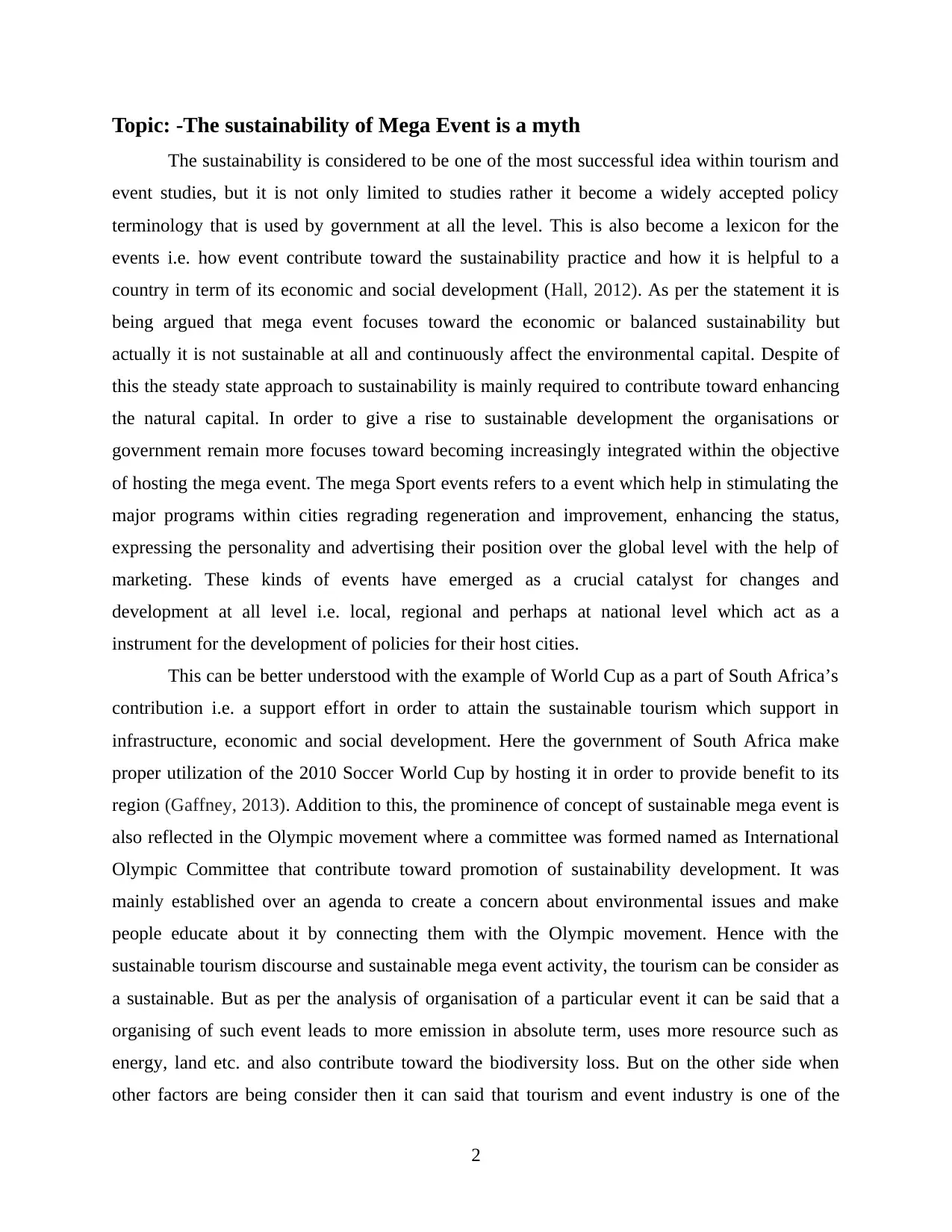
Topic: -The sustainability of Mega Event is a myth
The sustainability is considered to be one of the most successful idea within tourism and
event studies, but it is not only limited to studies rather it become a widely accepted policy
terminology that is used by government at all the level. This is also become a lexicon for the
events i.e. how event contribute toward the sustainability practice and how it is helpful to a
country in term of its economic and social development (Hall, 2012). As per the statement it is
being argued that mega event focuses toward the economic or balanced sustainability but
actually it is not sustainable at all and continuously affect the environmental capital. Despite of
this the steady state approach to sustainability is mainly required to contribute toward enhancing
the natural capital. In order to give a rise to sustainable development the organisations or
government remain more focuses toward becoming increasingly integrated within the objective
of hosting the mega event. The mega Sport events refers to a event which help in stimulating the
major programs within cities regrading regeneration and improvement, enhancing the status,
expressing the personality and advertising their position over the global level with the help of
marketing. These kinds of events have emerged as a crucial catalyst for changes and
development at all level i.e. local, regional and perhaps at national level which act as a
instrument for the development of policies for their host cities.
This can be better understood with the example of World Cup as a part of South Africa’s
contribution i.e. a support effort in order to attain the sustainable tourism which support in
infrastructure, economic and social development. Here the government of South Africa make
proper utilization of the 2010 Soccer World Cup by hosting it in order to provide benefit to its
region (Gaffney, 2013). Addition to this, the prominence of concept of sustainable mega event is
also reflected in the Olympic movement where a committee was formed named as International
Olympic Committee that contribute toward promotion of sustainability development. It was
mainly established over an agenda to create a concern about environmental issues and make
people educate about it by connecting them with the Olympic movement. Hence with the
sustainable tourism discourse and sustainable mega event activity, the tourism can be consider as
a sustainable. But as per the analysis of organisation of a particular event it can be said that a
organising of such event leads to more emission in absolute term, uses more resource such as
energy, land etc. and also contribute toward the biodiversity loss. But on the other side when
other factors are being consider then it can said that tourism and event industry is one of the
2
The sustainability is considered to be one of the most successful idea within tourism and
event studies, but it is not only limited to studies rather it become a widely accepted policy
terminology that is used by government at all the level. This is also become a lexicon for the
events i.e. how event contribute toward the sustainability practice and how it is helpful to a
country in term of its economic and social development (Hall, 2012). As per the statement it is
being argued that mega event focuses toward the economic or balanced sustainability but
actually it is not sustainable at all and continuously affect the environmental capital. Despite of
this the steady state approach to sustainability is mainly required to contribute toward enhancing
the natural capital. In order to give a rise to sustainable development the organisations or
government remain more focuses toward becoming increasingly integrated within the objective
of hosting the mega event. The mega Sport events refers to a event which help in stimulating the
major programs within cities regrading regeneration and improvement, enhancing the status,
expressing the personality and advertising their position over the global level with the help of
marketing. These kinds of events have emerged as a crucial catalyst for changes and
development at all level i.e. local, regional and perhaps at national level which act as a
instrument for the development of policies for their host cities.
This can be better understood with the example of World Cup as a part of South Africa’s
contribution i.e. a support effort in order to attain the sustainable tourism which support in
infrastructure, economic and social development. Here the government of South Africa make
proper utilization of the 2010 Soccer World Cup by hosting it in order to provide benefit to its
region (Gaffney, 2013). Addition to this, the prominence of concept of sustainable mega event is
also reflected in the Olympic movement where a committee was formed named as International
Olympic Committee that contribute toward promotion of sustainability development. It was
mainly established over an agenda to create a concern about environmental issues and make
people educate about it by connecting them with the Olympic movement. Hence with the
sustainable tourism discourse and sustainable mega event activity, the tourism can be consider as
a sustainable. But as per the analysis of organisation of a particular event it can be said that a
organising of such event leads to more emission in absolute term, uses more resource such as
energy, land etc. and also contribute toward the biodiversity loss. But on the other side when
other factors are being consider then it can said that tourism and event industry is one of the
2
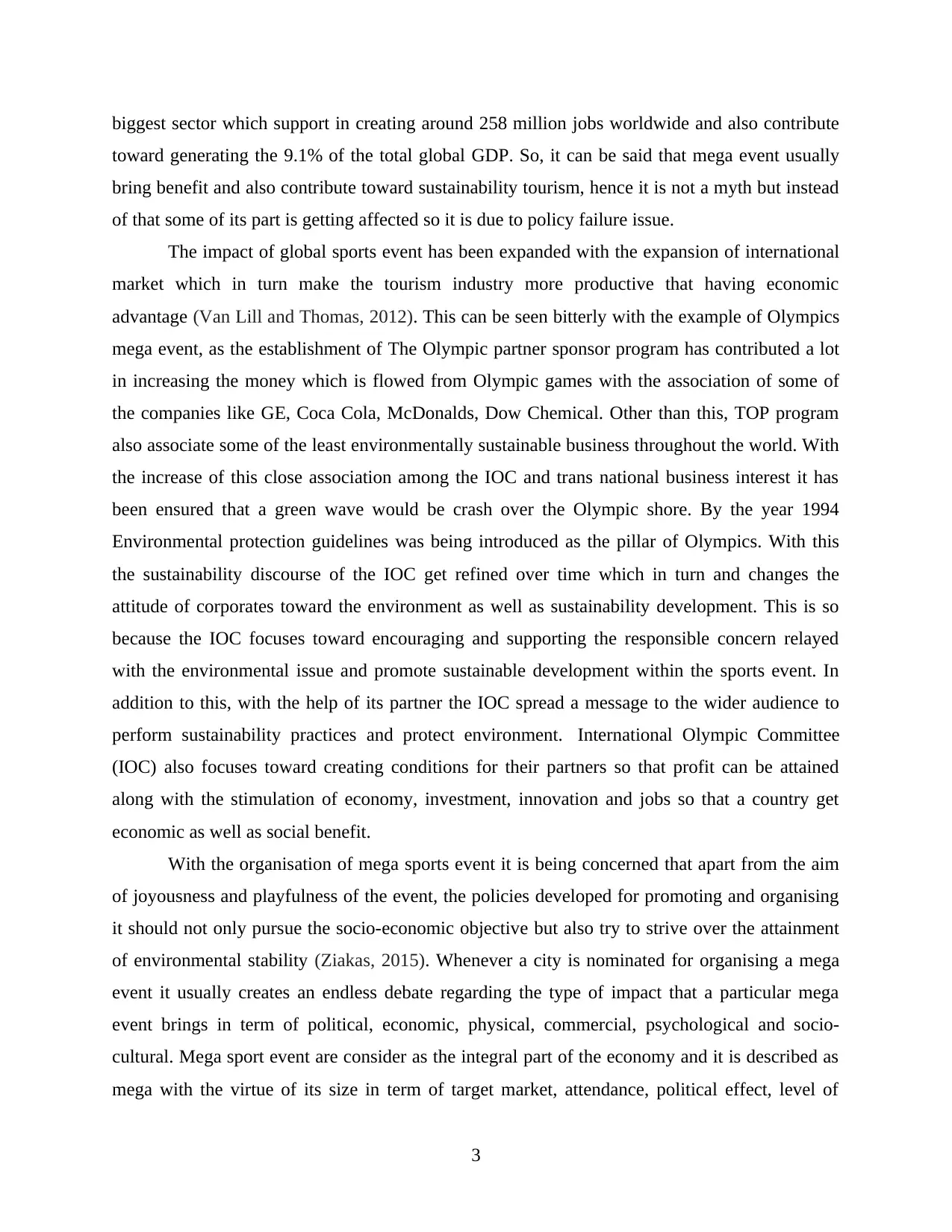
biggest sector which support in creating around 258 million jobs worldwide and also contribute
toward generating the 9.1% of the total global GDP. So, it can be said that mega event usually
bring benefit and also contribute toward sustainability tourism, hence it is not a myth but instead
of that some of its part is getting affected so it is due to policy failure issue.
The impact of global sports event has been expanded with the expansion of international
market which in turn make the tourism industry more productive that having economic
advantage (Van Lill and Thomas, 2012). This can be seen bitterly with the example of Olympics
mega event, as the establishment of The Olympic partner sponsor program has contributed a lot
in increasing the money which is flowed from Olympic games with the association of some of
the companies like GE, Coca Cola, McDonalds, Dow Chemical. Other than this, TOP program
also associate some of the least environmentally sustainable business throughout the world. With
the increase of this close association among the IOC and trans national business interest it has
been ensured that a green wave would be crash over the Olympic shore. By the year 1994
Environmental protection guidelines was being introduced as the pillar of Olympics. With this
the sustainability discourse of the IOC get refined over time which in turn and changes the
attitude of corporates toward the environment as well as sustainability development. This is so
because the IOC focuses toward encouraging and supporting the responsible concern relayed
with the environmental issue and promote sustainable development within the sports event. In
addition to this, with the help of its partner the IOC spread a message to the wider audience to
perform sustainability practices and protect environment. International Olympic Committee
(IOC) also focuses toward creating conditions for their partners so that profit can be attained
along with the stimulation of economy, investment, innovation and jobs so that a country get
economic as well as social benefit.
With the organisation of mega sports event it is being concerned that apart from the aim
of joyousness and playfulness of the event, the policies developed for promoting and organising
it should not only pursue the socio-economic objective but also try to strive over the attainment
of environmental stability (Ziakas, 2015). Whenever a city is nominated for organising a mega
event it usually creates an endless debate regarding the type of impact that a particular mega
event brings in term of political, economic, physical, commercial, psychological and socio-
cultural. Mega sport event are consider as the integral part of the economy and it is described as
mega with the virtue of its size in term of target market, attendance, political effect, level of
3
toward generating the 9.1% of the total global GDP. So, it can be said that mega event usually
bring benefit and also contribute toward sustainability tourism, hence it is not a myth but instead
of that some of its part is getting affected so it is due to policy failure issue.
The impact of global sports event has been expanded with the expansion of international
market which in turn make the tourism industry more productive that having economic
advantage (Van Lill and Thomas, 2012). This can be seen bitterly with the example of Olympics
mega event, as the establishment of The Olympic partner sponsor program has contributed a lot
in increasing the money which is flowed from Olympic games with the association of some of
the companies like GE, Coca Cola, McDonalds, Dow Chemical. Other than this, TOP program
also associate some of the least environmentally sustainable business throughout the world. With
the increase of this close association among the IOC and trans national business interest it has
been ensured that a green wave would be crash over the Olympic shore. By the year 1994
Environmental protection guidelines was being introduced as the pillar of Olympics. With this
the sustainability discourse of the IOC get refined over time which in turn and changes the
attitude of corporates toward the environment as well as sustainability development. This is so
because the IOC focuses toward encouraging and supporting the responsible concern relayed
with the environmental issue and promote sustainable development within the sports event. In
addition to this, with the help of its partner the IOC spread a message to the wider audience to
perform sustainability practices and protect environment. International Olympic Committee
(IOC) also focuses toward creating conditions for their partners so that profit can be attained
along with the stimulation of economy, investment, innovation and jobs so that a country get
economic as well as social benefit.
With the organisation of mega sports event it is being concerned that apart from the aim
of joyousness and playfulness of the event, the policies developed for promoting and organising
it should not only pursue the socio-economic objective but also try to strive over the attainment
of environmental stability (Ziakas, 2015). Whenever a city is nominated for organising a mega
event it usually creates an endless debate regarding the type of impact that a particular mega
event brings in term of political, economic, physical, commercial, psychological and socio-
cultural. Mega sport event are consider as the integral part of the economy and it is described as
mega with the virtue of its size in term of target market, attendance, political effect, level of
3
⊘ This is a preview!⊘
Do you want full access?
Subscribe today to unlock all pages.

Trusted by 1+ million students worldwide
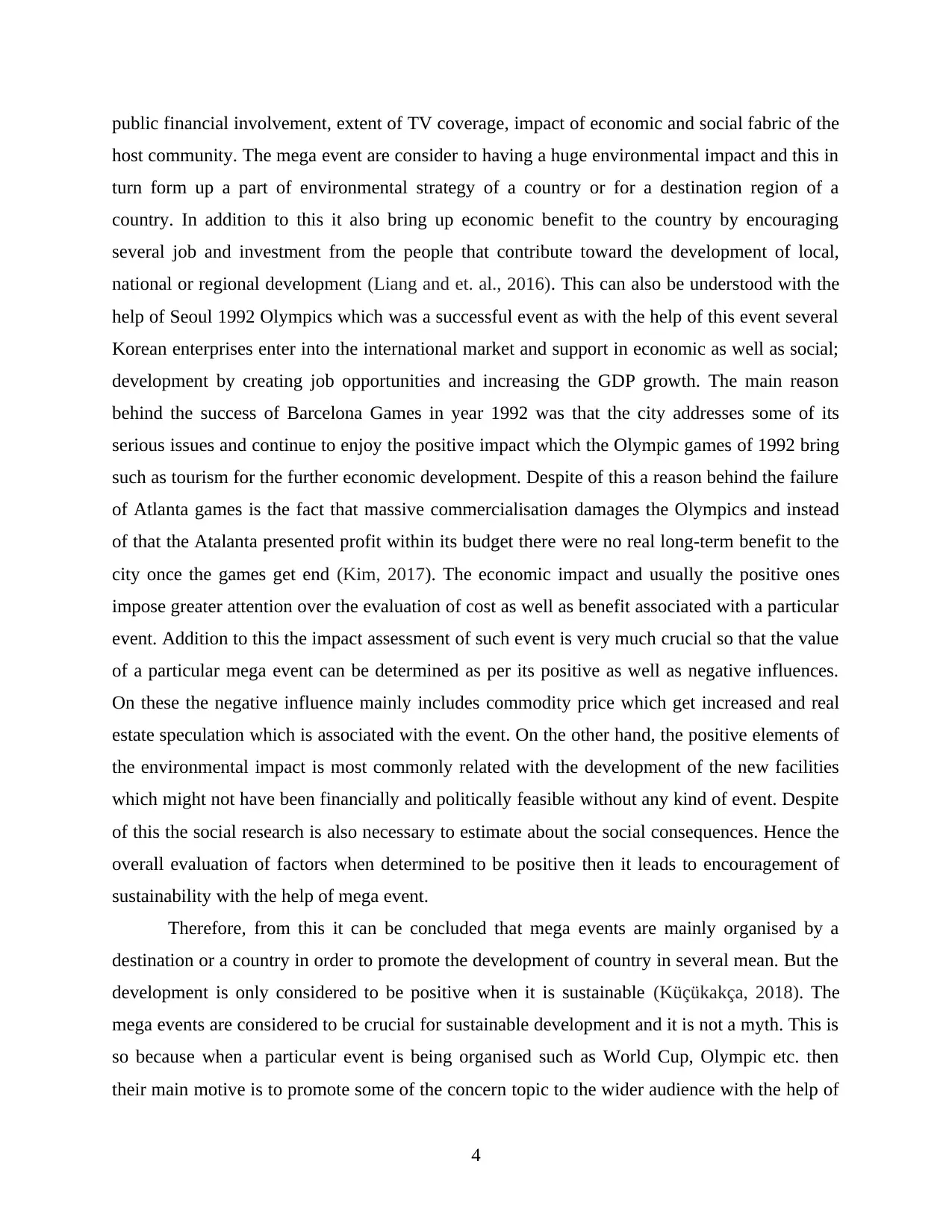
public financial involvement, extent of TV coverage, impact of economic and social fabric of the
host community. The mega event are consider to having a huge environmental impact and this in
turn form up a part of environmental strategy of a country or for a destination region of a
country. In addition to this it also bring up economic benefit to the country by encouraging
several job and investment from the people that contribute toward the development of local,
national or regional development (Liang and et. al., 2016). This can also be understood with the
help of Seoul 1992 Olympics which was a successful event as with the help of this event several
Korean enterprises enter into the international market and support in economic as well as social;
development by creating job opportunities and increasing the GDP growth. The main reason
behind the success of Barcelona Games in year 1992 was that the city addresses some of its
serious issues and continue to enjoy the positive impact which the Olympic games of 1992 bring
such as tourism for the further economic development. Despite of this a reason behind the failure
of Atlanta games is the fact that massive commercialisation damages the Olympics and instead
of that the Atalanta presented profit within its budget there were no real long-term benefit to the
city once the games get end (Kim, 2017). The economic impact and usually the positive ones
impose greater attention over the evaluation of cost as well as benefit associated with a particular
event. Addition to this the impact assessment of such event is very much crucial so that the value
of a particular mega event can be determined as per its positive as well as negative influences.
On these the negative influence mainly includes commodity price which get increased and real
estate speculation which is associated with the event. On the other hand, the positive elements of
the environmental impact is most commonly related with the development of the new facilities
which might not have been financially and politically feasible without any kind of event. Despite
of this the social research is also necessary to estimate about the social consequences. Hence the
overall evaluation of factors when determined to be positive then it leads to encouragement of
sustainability with the help of mega event.
Therefore, from this it can be concluded that mega events are mainly organised by a
destination or a country in order to promote the development of country in several mean. But the
development is only considered to be positive when it is sustainable (Küçükakça, 2018). The
mega events are considered to be crucial for sustainable development and it is not a myth. This is
so because when a particular event is being organised such as World Cup, Olympic etc. then
their main motive is to promote some of the concern topic to the wider audience with the help of
4
host community. The mega event are consider to having a huge environmental impact and this in
turn form up a part of environmental strategy of a country or for a destination region of a
country. In addition to this it also bring up economic benefit to the country by encouraging
several job and investment from the people that contribute toward the development of local,
national or regional development (Liang and et. al., 2016). This can also be understood with the
help of Seoul 1992 Olympics which was a successful event as with the help of this event several
Korean enterprises enter into the international market and support in economic as well as social;
development by creating job opportunities and increasing the GDP growth. The main reason
behind the success of Barcelona Games in year 1992 was that the city addresses some of its
serious issues and continue to enjoy the positive impact which the Olympic games of 1992 bring
such as tourism for the further economic development. Despite of this a reason behind the failure
of Atlanta games is the fact that massive commercialisation damages the Olympics and instead
of that the Atalanta presented profit within its budget there were no real long-term benefit to the
city once the games get end (Kim, 2017). The economic impact and usually the positive ones
impose greater attention over the evaluation of cost as well as benefit associated with a particular
event. Addition to this the impact assessment of such event is very much crucial so that the value
of a particular mega event can be determined as per its positive as well as negative influences.
On these the negative influence mainly includes commodity price which get increased and real
estate speculation which is associated with the event. On the other hand, the positive elements of
the environmental impact is most commonly related with the development of the new facilities
which might not have been financially and politically feasible without any kind of event. Despite
of this the social research is also necessary to estimate about the social consequences. Hence the
overall evaluation of factors when determined to be positive then it leads to encouragement of
sustainability with the help of mega event.
Therefore, from this it can be concluded that mega events are mainly organised by a
destination or a country in order to promote the development of country in several mean. But the
development is only considered to be positive when it is sustainable (Küçükakça, 2018). The
mega events are considered to be crucial for sustainable development and it is not a myth. This is
so because when a particular event is being organised such as World Cup, Olympic etc. then
their main motive is to promote some of the concern topic to the wider audience with the help of
4
Paraphrase This Document
Need a fresh take? Get an instant paraphrase of this document with our AI Paraphraser
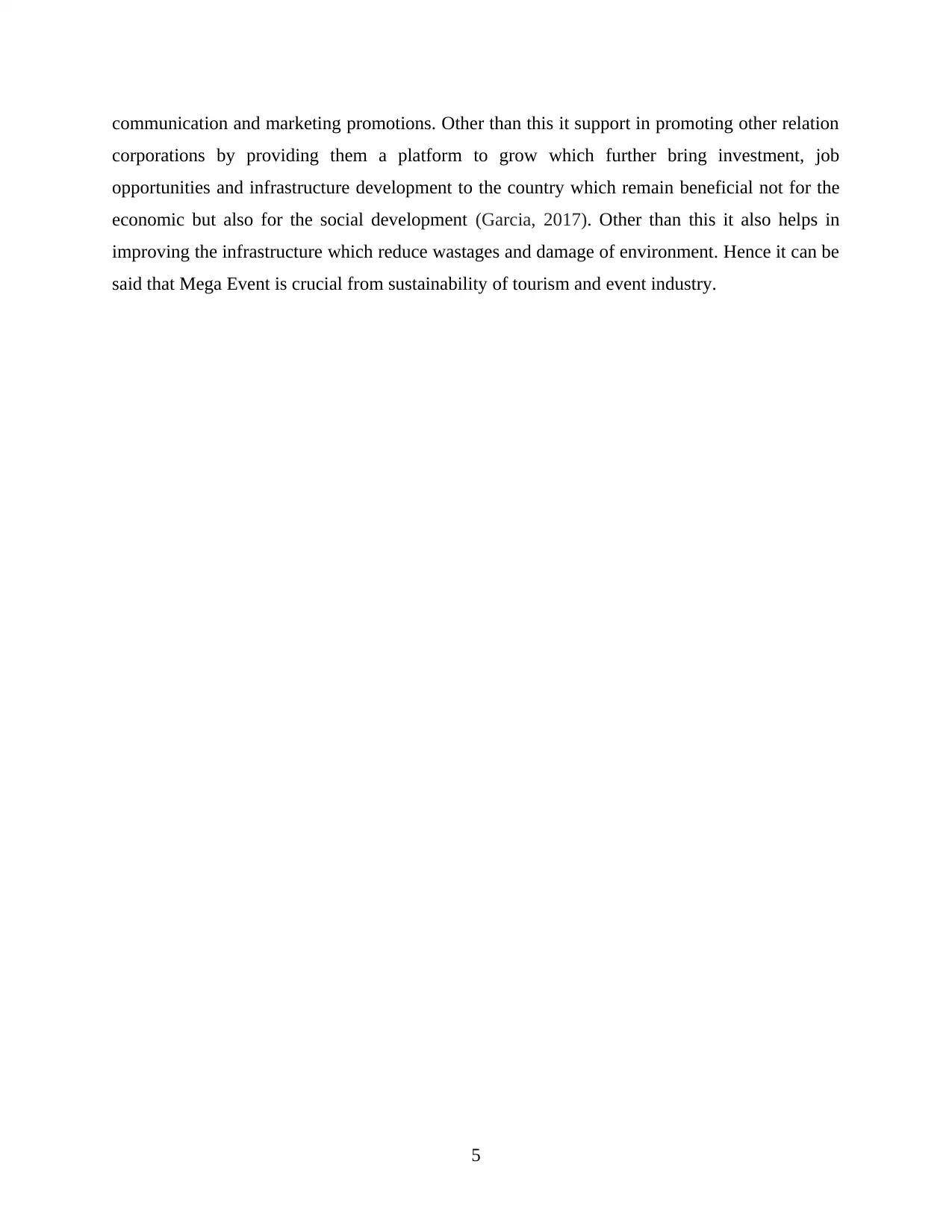
communication and marketing promotions. Other than this it support in promoting other relation
corporations by providing them a platform to grow which further bring investment, job
opportunities and infrastructure development to the country which remain beneficial not for the
economic but also for the social development (Garcia, 2017). Other than this it also helps in
improving the infrastructure which reduce wastages and damage of environment. Hence it can be
said that Mega Event is crucial from sustainability of tourism and event industry.
5
corporations by providing them a platform to grow which further bring investment, job
opportunities and infrastructure development to the country which remain beneficial not for the
economic but also for the social development (Garcia, 2017). Other than this it also helps in
improving the infrastructure which reduce wastages and damage of environment. Hence it can be
said that Mega Event is crucial from sustainability of tourism and event industry.
5
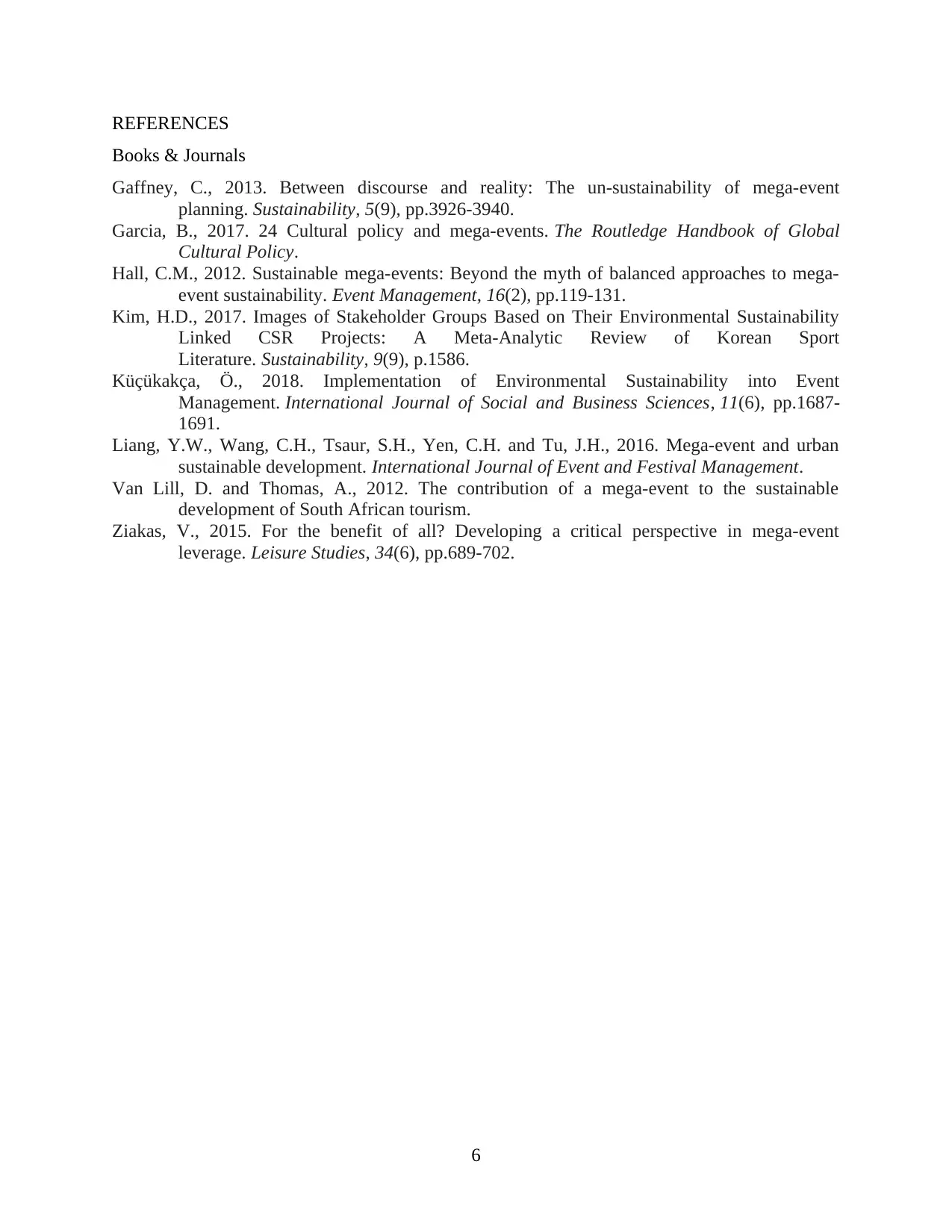
REFERENCES
Books & Journals
Gaffney, C., 2013. Between discourse and reality: The un-sustainability of mega-event
planning. Sustainability, 5(9), pp.3926-3940.
Garcia, B., 2017. 24 Cultural policy and mega-events. The Routledge Handbook of Global
Cultural Policy.
Hall, C.M., 2012. Sustainable mega-events: Beyond the myth of balanced approaches to mega-
event sustainability. Event Management, 16(2), pp.119-131.
Kim, H.D., 2017. Images of Stakeholder Groups Based on Their Environmental Sustainability
Linked CSR Projects: A Meta-Analytic Review of Korean Sport
Literature. Sustainability, 9(9), p.1586.
Küçükakça, Ö., 2018. Implementation of Environmental Sustainability into Event
Management. International Journal of Social and Business Sciences, 11(6), pp.1687-
1691.
Liang, Y.W., Wang, C.H., Tsaur, S.H., Yen, C.H. and Tu, J.H., 2016. Mega-event and urban
sustainable development. International Journal of Event and Festival Management.
Van Lill, D. and Thomas, A., 2012. The contribution of a mega-event to the sustainable
development of South African tourism.
Ziakas, V., 2015. For the benefit of all? Developing a critical perspective in mega-event
leverage. Leisure Studies, 34(6), pp.689-702.
6
Books & Journals
Gaffney, C., 2013. Between discourse and reality: The un-sustainability of mega-event
planning. Sustainability, 5(9), pp.3926-3940.
Garcia, B., 2017. 24 Cultural policy and mega-events. The Routledge Handbook of Global
Cultural Policy.
Hall, C.M., 2012. Sustainable mega-events: Beyond the myth of balanced approaches to mega-
event sustainability. Event Management, 16(2), pp.119-131.
Kim, H.D., 2017. Images of Stakeholder Groups Based on Their Environmental Sustainability
Linked CSR Projects: A Meta-Analytic Review of Korean Sport
Literature. Sustainability, 9(9), p.1586.
Küçükakça, Ö., 2018. Implementation of Environmental Sustainability into Event
Management. International Journal of Social and Business Sciences, 11(6), pp.1687-
1691.
Liang, Y.W., Wang, C.H., Tsaur, S.H., Yen, C.H. and Tu, J.H., 2016. Mega-event and urban
sustainable development. International Journal of Event and Festival Management.
Van Lill, D. and Thomas, A., 2012. The contribution of a mega-event to the sustainable
development of South African tourism.
Ziakas, V., 2015. For the benefit of all? Developing a critical perspective in mega-event
leverage. Leisure Studies, 34(6), pp.689-702.
6
⊘ This is a preview!⊘
Do you want full access?
Subscribe today to unlock all pages.

Trusted by 1+ million students worldwide
1 out of 6
Related Documents
Your All-in-One AI-Powered Toolkit for Academic Success.
+13062052269
info@desklib.com
Available 24*7 on WhatsApp / Email
![[object Object]](/_next/static/media/star-bottom.7253800d.svg)
Unlock your academic potential
Copyright © 2020–2026 A2Z Services. All Rights Reserved. Developed and managed by ZUCOL.




